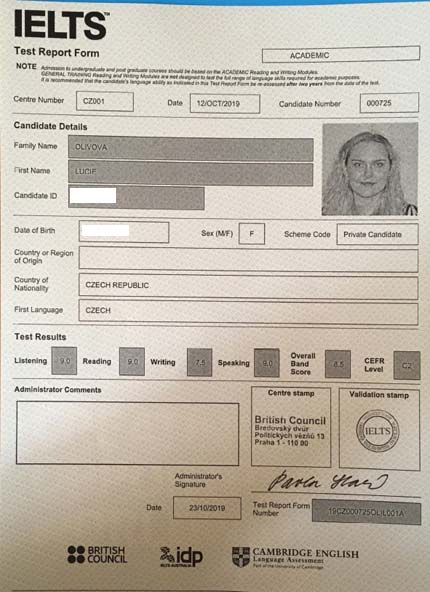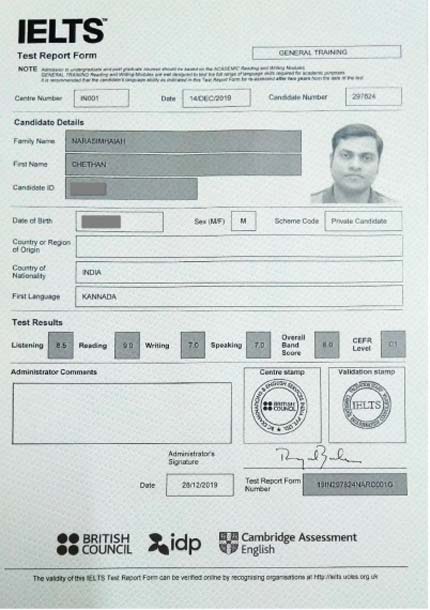Today we would like you to meet two test takers who scored Band 8+ in IELTS and shared some tips and recommendations.
Introducing Lucie Olivova – the winner of our IELTS Results Competition from Czech Republic. Lucie got an Overall Band Score of 8.5 with three amazing 9’s in Listening, Reading and Speaking – and no, she isn’t a native English speaker, but some things she did in her preparation helped her get very, very close to that level.

When we asked Lucie what helped her achieve this wonderful score, she said:
“Thank you very much for the information and for creating this competition in the first place – I believe it is a nice way to add a layer of appreciation for people successfully passing the test.
As for my tips and recommendations –
1. I would say immersion is really important when learning any language.
2. Listening to podcasts or music, watching television or videos, reading books or newspaper in that language really helps you get familiar with many daily used expressions.
3. Reading specifically I think is a great help for spelling – seeing words in writing repeatedly gives you the “feel” for correct spelling.
4. A truly important thing is getting familiar with the test format so that no new question type surprises you on the test day.
5. Last but not least, practice writing as much as possible and make sure you know what structure is expected for each writing task. You need to know what an essay should look like and it is really helpful to have experience writing it in a limited time – do not only read about how to write an essay, give it a try a few times! To enhance your essay, try to use some special grammar, but only if you are sure you are able to use it correctly with confidence.
Good luck to everyone!”
Our second test taker with a high IELTS result is Chethan from India, who got an Overall Band Score of 8.0, with 8.5 in Listening and 9 in Reading.

Chethan is a native Kannada speaker, and here is what he told us about his IELTS preparation:
“I gave a couple of mock tests for reading and listening to check my standing. I found that I scored around 34 to 36 in both tests. So I was pretty confident on these two modules.
For speaking and writing I needed some help and feedback without which I could not improve. So I went for a training session which was highly recommended by many. I mainly focused on speaking and writing. The trainers were both British Council certified trainers and they helped me a lot. In fact, they did an initial mock test and found my speaking to be average but writing was bad. In fact I could not complete my writing tasks on time due to me not writing in a long time.
They planned a few sessions where they would walk me through each section of speaking and writing one at a time. We worked on setting up a flow as below
1. Mindmap the ideas and points for the topic at hand (2 – 5 minutes)
2. Formulate the structure of the essay / letter based on the type of essay / letter (2 – 3 minutes)
3. Assign the mindmap points as Introduction, Paragraph 1, Paragraph 2, so on. (2 -3 minutes)
4. Expand the points above by thinking of additional support points (2 – 4 minutes)
5. Start writing the essay / letter (12-20 minutes)
6. Review the content for basic errors like spelling, grammar (2 – 5 minutes)
Then, gradually, we worked on getting them together so that the last week we practiced with few mock tests taking up full sections in one go.
One thing that worked in my favour was the scheduling of the Speaking Test. It was scheduled 5 days after my paper exam. So I focused only on the 3 sections at first and worked through many practice papers. The practice helped as I was getting a consistent score of 36 and more in Reading and Listening and this is reflected in my actual score. Once my exam was over, I practiced speaking with my wife sometimes and sometimes sitting in front of a mirror. I could not get a hold of my trainers during this time and I had to rely on my wife’s feedback mostly.”
Many thanks to Lucie and Chethan for providing these tips, and congratulations on their wonderful IELTS scores!
If YOU got a high score in IELTS, no matter when – this month, last month, a few months ago – we want to hear from you! We would like to extend our warm invitation to everyone who is happy with their IELTS score. Take part in our IELTS results competition today, and share your IELTS tips when you win!
https://ift.tt/37FkqpH
from IELTS-Blog https://ift.tt/2tjfckC
via IFTTT

